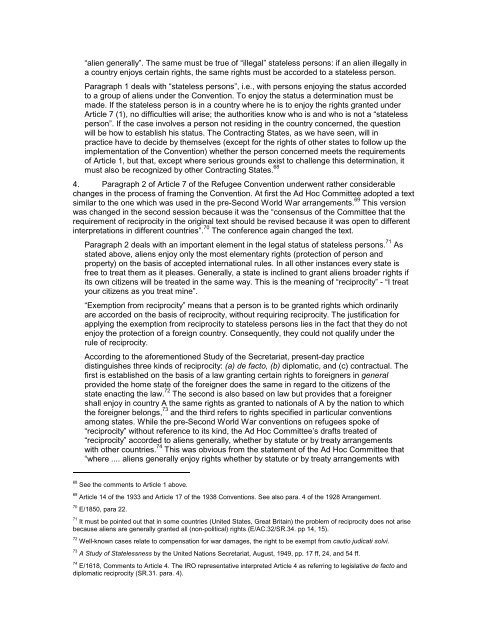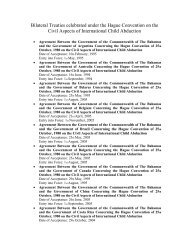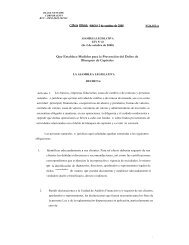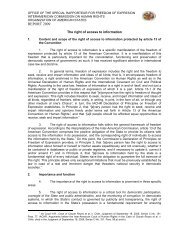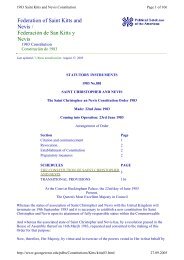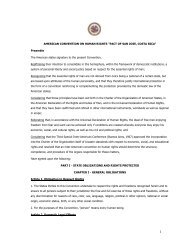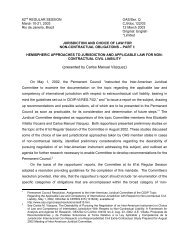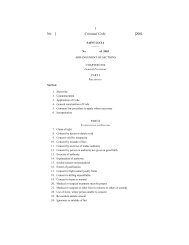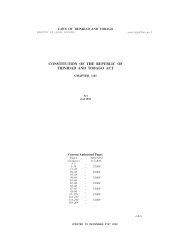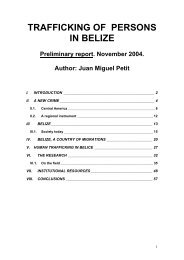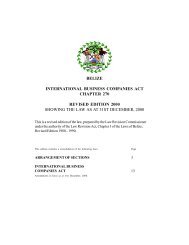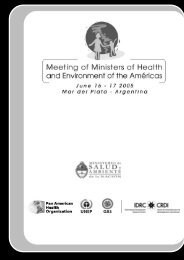CONVENTION RELATING TO THE STATUS OF ... - Refworld
CONVENTION RELATING TO THE STATUS OF ... - Refworld
CONVENTION RELATING TO THE STATUS OF ... - Refworld
You also want an ePaper? Increase the reach of your titles
YUMPU automatically turns print PDFs into web optimized ePapers that Google loves.
“alien generally”. The same must be true of “illegal” stateless persons: if an alien illegally in<br />
a country enjoys certain rights, the same rights must be accorded to a stateless person.<br />
Paragraph 1 deals with “stateless persons”, i.e., with persons enjoying the status accorded<br />
to a group of aliens under the Convention. To enjoy the status a determination must be<br />
made. If the stateless person is in a country where he is to enjoy the rights granted under<br />
Article 7 (1), no difficulties will arise; the authorities know who is and who is not a “stateless<br />
person”. If the case involves a person not residing in the country concerned, the question<br />
will be how to establish his status. The Contracting States, as we have seen, will in<br />
practice have to decide by themselves (except for the rights of other states to follow up the<br />
implementation of the Convention) whether the person concerned meets the requirements<br />
of Article 1, but that, except where serious grounds exist to challenge this determination, it<br />
must also be recognized by other Contracting States. 68<br />
4. Paragraph 2 of Article 7 of the Refugee Convention underwent rather considerable<br />
changes in the process of framing the Convention. At first the Ad Hoc Committee adopted a text<br />
similar to the one which was used in the pre-Second World War arrangements. 69 This version<br />
was changed in the second session because it was the “consensus of the Committee that the<br />
requirement of reciprocity in the original text should be revised because it was open to different<br />
interpretations in different countries”. 70 The conference again changed the text.<br />
Paragraph 2 deals with an important element in the legal status of stateless persons. 71 As<br />
stated above, aliens enjoy only the most elementary rights (protection of person and<br />
property) on the basis of accepted international rules. In all other instances every state is<br />
free to treat them as it pleases. Generally, a state is inclined to grant aliens broader rights if<br />
its own citizens will be treated in the same way. This is the meaning of “reciprocity” - “I treat<br />
your citizens as you treat mine”.<br />
“Exemption from reciprocity” means that a person is to be granted rights which ordinarily<br />
are accorded on the basis of reciprocity, without requiring reciprocity. The justification for<br />
applying the exemption from reciprocity to stateless persons lies in the fact that they do not<br />
enjoy the protection of a foreign country. Consequently, they could not qualify under the<br />
rule of reciprocity.<br />
According to the aforementioned Study of the Secretariat, present-day practice<br />
distinguishes three kinds of reciprocity: (a) de facto, (b) diplomatic, and (c) contractual. The<br />
first is established on the basis of a law granting certain rights to foreigners in general<br />
provided the home state of the foreigner does the same in regard to the citizens of the<br />
state enacting the law. 72 The second is also based on law but provides that a foreigner<br />
shall enjoy in country A the same rights as granted to nationals of A by the nation to which<br />
the foreigner belongs, 73 and the third refers to rights specified in particular conventions<br />
among states. While the pre-Second World War conventions on refugees spoke of<br />
“reciprocity” without reference to its kind, the Ad Hoc Committee’s drafts treated of<br />
“reciprocity” accorded to aliens generally, whether by statute or by treaty arrangements<br />
with other countries. 74 This was obvious from the statement of the Ad Hoc Committee that<br />
“where .... aliens generally enjoy rights whether by statute or by treaty arrangements with<br />
68 See the comments to Article 1 above.<br />
69 Article 14 of the 1933 and Article 17 of the 1938 Conventions. See also para. 4 of the 1928 Arrangement.<br />
70 E/1850, para 22.<br />
71 It must be pointed out that in some countries (United States, Great Britain) the problem of reciprocity does not arise<br />
because aliens are generally granted all (non-political) rights (E/AC.32/SR.34. pp 14, 15).<br />
72 Well-known cases relate to compensation for war damages, the right to be exempt from cautio judicati solvi.<br />
73 A Study of Statelessness by the United Nations Secretariat, August, 1949, pp. 17 ff, 24, and 54 ff.<br />
74 E/1618, Comments to Article 4. The IRO representative interpreted Article 4 as referring to legislative de facto and<br />
diplomatic reciprocity (SR.31. para. 4).


